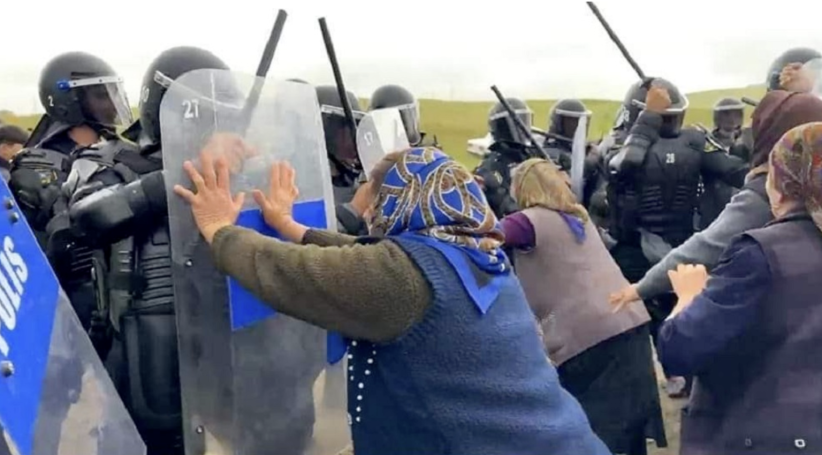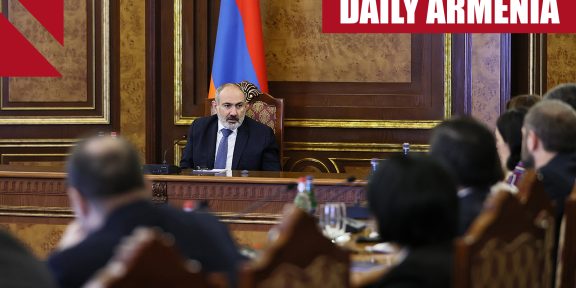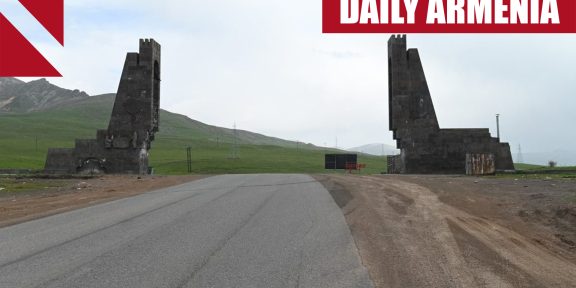By Mane Berikyan
For over three weeks, police have been blockading the village of Soyudlu in western Azerbaijan after clashes with residents who are protesting pollution caused by a nearby gold mine.
Azerbaijani villagers gathered on June 20 to demonstrate against alleged plans to create an artificial lake that would become the dumping ground for chemical waste from the Gadabay gold mine. Although officially operated by the British company Anglo Asian Mining PLC, the gold mine has been linked to Azerbaijani President Ilham Aliyev’s family.
The construction of such a lake would be the second of its kind in Soyudlu. An artificial lake created over a decade ago as a dumping ground for the mine’s waste has been emitting cyanide and other toxic fumes for years.
Villagers say the pollution has caused health problems, including lung problems and and cancer, and is damaging their pastures and crops.
Riot police clashed with demonstrators, many of whom were elderly women, using tear gas to violently disperse protests and injuring 15. Ten protesters were detained, along with two journalists whose phones were confiscated. Several activists and journalists have also been forcibly removed from the village or arrested since the protests for being critical of police response and brutality.
Police have reportedly blocked movement in and out of the village since June 21 and have set up checkpoints along the entrances to check documents for anyone entering or leaving. According to local reports, police are patrolling every street in the village, which has a population of 3,000.
The siege of the village is the latest instance of an apparent Blockade-As-Policy tactic by the Azerbaijani government, which for seven months has been blockading Nagorno-Karabakh and causing a quickly escalating humanitarian crisis.
Read more: 7 months of blockade in Karabakh
Aliyev publicly addressed the issue for the first time on Tuesday, expressing strong support for the police while also accusing the Ecology Ministry of negligence and calling for an investigation into the Anglo Asian Mining company’s operations in Gadabay.
Azerbaijan’s Ecology Ministry announced on Thursday that operations at the mine would be temporarily suspended amid the ongoing blockade.
NAGORNO-KARABAKH
The police blockade of Soyudlu came as Nagorno-Karabakh entered its seven month under Azerbaijani blockade, raising questions about an evident double standard.
Last December, a group of self-proclaimed Azerbaijani environmental activists began blocking the Lachin corridor, the only overland route connecting Nagorno-Karabakh to Armenia and the rest of the world, citing unfounded concerns about alleged illegal mining. Many of them later were revealed to have ties to the Azerbaijani government.
In April, Azerbaijani border guards dramatically escalated the situation, illegally setting up a checkpoint on the corridor.
Now with Azerbaijan’s blockade at the seven-month mark, Karabakh faces total isolation: Russian peacekeepers have been blocked from the region since last month, while Azerbaijan again began refusing entry to the Red Cross yesterday.
With those lifelines gone, concern is mounting over the unfolding humanitarian crisis.
Now, a stark contrast is emerging between how Baku deploys fake environmental activism to achieve geopolitical goals and how it deals with real environmental activism within its borders.
While Azerbaijan has weaponized eco-activism to pressure and apparently starve out Nagorno-Karabakh’s 120,000-strong civilian population, it cracks down harshly on its own citizens who raise genuine environmental concerns.
“It’s interesting that Azerbaijan has been using democratic narratives and instrumentalizing them for achieving authoritarian goals,” political analyst Tigran Grigoryan told CivilNet.
“That’s the trend we’ve been noticing since the end of the second Karabakh war.”
In Azerbaijan, the authoritarian regime in power brutally and regularly suppresses domestic dissent and civil liberties.
In this context, Grigoryan says, “Not just Azerbaijan is hypocritical, but all the people who are demanding any kind of resolution of the [Nagorno-Karabakh] conflict that envisages direct control of Baku over Nagorno Karabakh” are also hypocritical.
“If [Azerbaijanis] don’t have even these basic minimal rights to speak up against environmental issues, how would the Karabakh Armenians be able to talk about any of their concerns after this so-called integration?” Grigoryan asked.
















